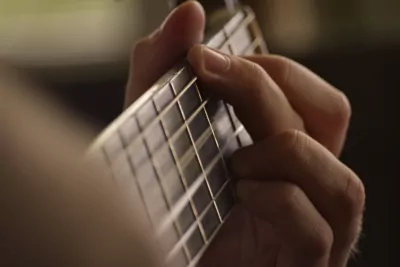Learning to play the guitar can be a wonderful experience, but beginners frequently experience finger pain and discomfort as calluses and finger strength increase. Here are some pointers to help you learn to play the guitar without injuring your fingers:
Begin Slowly: When you are just starting, take your time and practice at a slow speed. This allows your fingers to adapt to the pressure and movements required for playing without causing too much pain.
Good Technique: It is critical to learn good hand and finger placement. Check that your fingers are properly positioned on the frets and strings. The poor technique might cause further discomfort and possibly harm.
Consider Using Lighter Gauge Strings: If you play an acoustic guitar, consider using lighter gauge strings. These require less finger pressure to press down, which can help novices avoid finger soreness.
Learn to Play the Guitar
Consistent practice will help your fingers develop strength and calluses over time. Long gaps between practice sessions should be avoided because they can cause calluses to soften.
Take Breaks: While practice is essential, taking brief breaks during your sessions can allow your fingers to rest and heal. Don’t push yourself too hard at first.
Warm Up Your Fingers: Before you begin playing, warm up your fingers with some simple exercises. Work on finger strength and dexterity gradually by stretching and moving your fingers across the fretboard.
Stretching: Before and after playing, gently stretch your fingers. This can aid in increasing flexibility and decreasing stress in your hand muscles.
Proper Guitar Setup: Make sure your guitar is properly set up. A high-action guitar (the distance between the strings and the fretboard) can make playing difficult and unpleasant for your fingertips.
Pain vs. Discomfort: Some discomfort is typical as your fingers adapt, but you should not be in extreme pain. If you’re feeling intense pain, numbness, or tingling, you might be playing too forcefully or with poor technique. Stop playing and give your fingers a rest.
If your fingertips are really sensitive, try using finger protection goods such as fingertip protectors or finger cots. These are intended to relieve direct pressure on your fingertips as you develop calluses.
Drink plenty of water to keep your skin and fingertips hydrated, which can lead to healthy callus growth.
Patience is required when learning any musical instrument. Be patient with yourself and accept that the discomfort you’re feeling now will subside as you continue to practice.
Some discomfort is typical when you first start, but if the pain becomes unbearable or lingers, speak with a guitar teacher or a medical practitioner to verify you aren’t inflicting any harm to your fingers.

